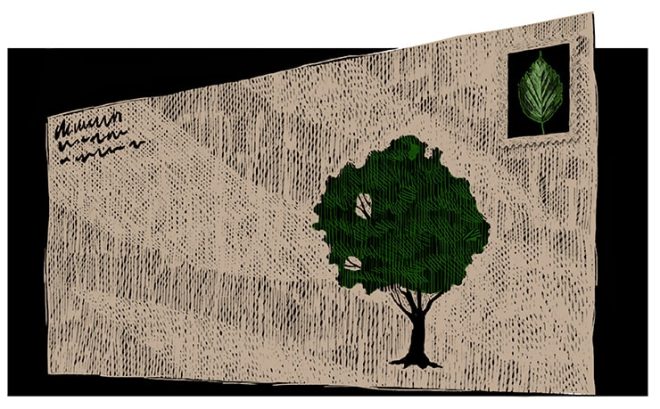Read by Matilda Longbottom

A recent study, published in 2015 in the journal Nature, calculated that there are three trillion trees on planet Earth. That’s 3,000,000,000,000 trees—a number that’s impossible to wrap one’s mind around unless you’re an astrophysicist or a politician accustomed to dealing with the national deficit. That’s a lot of trees.
Most of those trees aren’t ours. The lion’s share of the world’s trees, it turns out, live in tropical or subtropical forests. The United States is home to just 228 billion trees, a piddling 8% of the planetary total, which as of 2015—do the math—averaged out to 716 trees per person. This isn’t a patch on Brazil (1,494 trees per person), Russia (4,461), or Canada (8,954), but it’s still a whole lot better than China (102 trees per person) or India (a mere 28).
It’s possible to feel pretty possessive and personal about 716 trees. Numerically, that’s manageable. Anybody could relate to that. That’s about the size of the average American high school. Just imagine all those teenagers as trees.
The personal tree (or trees) isn’t an outlandish idea—at least based on an ongoing experiment in Melbourne, Australia. In 2013, the Melbourne city officials assigned all their urban trees ID numbers and email addresses, in hopes that concerned citizens would use the contact info to tattle about tree-related problems such as dangerous branches, signs of disease, and leafy blockage of traffic views. Instead, tree-loving Melbournians by the thousands used the email addresses to correspond with their favorite trees.
“Dear Elm,” wrote a green-leaf elm admirer, “As I was leaving St. Mary’s College today, I was struck, not by a branch, but by your radiant beauty. You must get these messages all the time. You’re such an attractive tree.”
“Dear Algerian Oak,” wrote another, “thank you for giving us oxygen. Thank you for being so pretty. I don’t know where I’d be without you to extract my carbon dioxide…Stay strong, stand tall amongst the crowd.”
“Dearest Golden Elm,” said yet another. “It always makes me so happy to see you standing there minding your own business. I have to say, you have the most beautiful canopy and I love how the light green leaves on your branches contrast with the darkness of your trunk…stay awesome.”
Even displaced Aussies and flat-out foreigners chimed in.
“Dear Gum,” one homesick Melbournian wrote from Texas to a hometown eucalyptus tree, “ I wanted very much to tell you how much I miss your family.”
This is so cute, I thought.
But it’s more than that.
For those people, their tree wasn’t just any old oak, elm, or eucalyptus. It was a one-of-a-kind individual, with a history and a personality. Those Melbournians really knew their trees.
Just how individual are trees, anyway? In biology, that’s a matter of debate. According to Charles Darwin, scientists studying species classification fall into two opposing camps: the lumpers, who favor stuffing everything together into a limited number of broad categories; and the splitters, who prefer many fine divisions based on teeny individual differences. For taxonomists, this leads to a lot of nitpicky in-house bickering about the DNA profiles of beetles and jellyfish. In everyday life with trees, it’s simpler: lumpers are people who think all trees are pretty much alike and splitters think that each tree is a unique creation—like all those people who write fan letters to “Dear Elm.”
Lumping has a practical side: trees, as a group, for example, are clearly different from peonies or potatoes. But it’s also prone to pitfalls. Lumping is what happens when we assign blanket characteristics to certain ethnic or political groups (I was raised with “All French Canadians drive like bats out of hell”), and that does none of us any good. People don’t lump very well.
Splitting may be the tack to take with trees these days, as well, because our trees could use some personal appreciation and attention. Trees, worldwide, are in trouble.
About 12,000 years ago—before the dawn of agriculture—scientists estimate that Earth was home to twice as many trees as are around today. That means, since we first started gardening, we’ve done in three trillion trees—and today, at best guess, we continue to lose ten billion every year. This is bad news for the world’s land animals and plants, 80% of whom live in forests, and it’s even worse for climate as a whole. Trees put water back in our atmosphere. Over 90% of the water sucked up by a tree’s roots is sprayed into the sky via stomata—tiny openings on the surface of the leaves—in a process known as transpiration. In other words, a lot of the rain falling down on our spring gardens is due to three trillion trees, raining up. We need those trees.
I can’t help but think that we’d do better at conservation if we saw our trees the way the Melbournians do. No one would lightly dispose of a tree with which they’ve forged a relationship. After all, you don’t cut down a pal.
“Dear 1037148,” wrote one Australian tree-lover, “you deserve to be known by more than a number.”
Yes, Dear Tree, you do.
At the very least, you deserve a name and an address. And a lot of encouraging mail. ❖


 Previous
Previous

